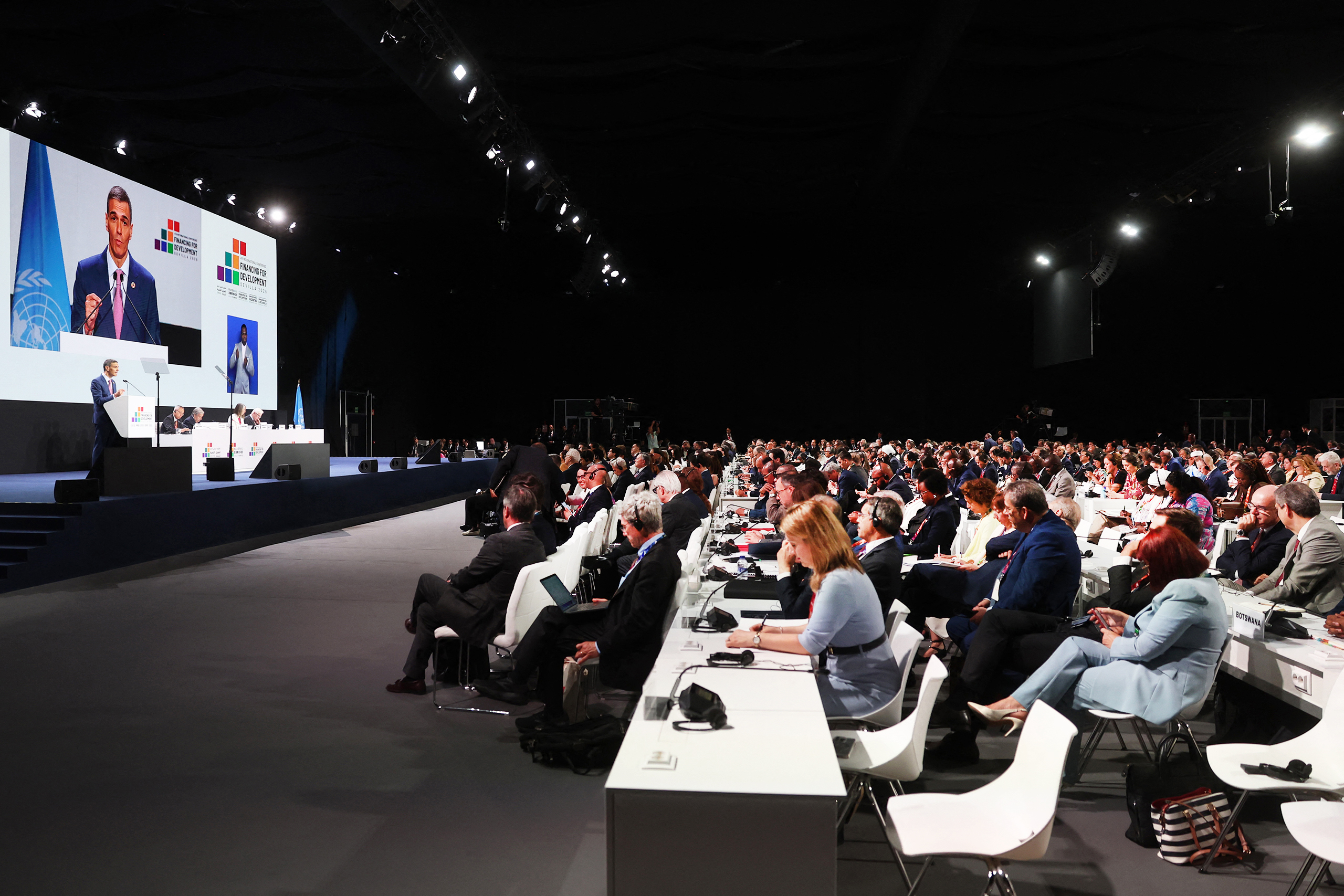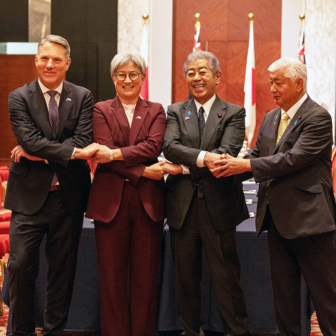Global governance is a tricky thing at the best of times. As the United Nations turns eighty, its charter’s opening words — “We, the peoples of the United Nations, determined to save succeeding generations from the scourge of war…” — are sounding rather hollow. The UN has not only failed to prevent war but its 1945-rooted governance regime, with the five permanent members of the Security Council (the United States, Britain, France, Russia and China) exercising a veto over collective decisions, means it is often paralysed when war breaks out. Neither the Russian invasion of Ukraine, nor Israel’s devastating assault on Gaza, nor the attack on Iran’s nuclear facilities by Israel and the US, has been criticised by the UN.
Oddly, though, and little noticed, another dynamic has emerged in the six months since Donald Trump returned to the White House. This is the phenomenon of global governance without US participation, and it has been on vivid display at the Fourth UN Financing for Development Conference, or FfD4, in Seville, Spain, this past week.
These conferences don’t happen very often. A forum for the international community to review the progress of the Sustainable Development Goals and discuss new ways to finance their achievement in the Global South, the last one, FfD3, was in 2015.
Until three weeks ago, the negotiations for FfD4 had been fractious and protracted. Developing countries were angry at overseas-aid cutbacks by many of the world’s richest nations — notably the United States (which has abolished its aid agency, USAID) but also Britain, France and others. In turn, the developed countries insisted that developing nations should raise more resources from their own populations, both in taxes and savings. They wanted the private sector to be more involved in development; the poorer countries countered that global capital is not interested in their economies.
Negotiations seemed deadlocked. And then a strange thing happened. Having tried and failed to get the goal of “sustainable development” — a mainstay of the global consensus since 1992 — deleted from the text, along with all mention of climate change (ditto), the United States decided to withdraw altogether from the negotiations. Its delegation walked out.
The reaction of the remaining 192 countries was swift, and perhaps unexpected. They almost immediately agreed on a compromise text drawn up by the conference chairs (Mexico, Nepal, Norway and Zambia) and the UN secretariat. The Compromiso de Sevilla is an artful summary of a new global consensus (or at least, a consensus minus one) about how financing can be found for investment in health and education, sanitation and electricity, gender equality and environmental protection.
The Compromiso’s core principle can be described as “all of the above.” The world needs more grant aid and more business sector investment; higher domestic taxes and larger international flows; more lending and more debt relief. It contains a wealth of proposals in all these areas, and others, along with a broad commitment to making the “international financial architecture” fairer and more inclusive of countries in the global South.
No country is entirely happy with it. But the American withdrawal forced the remaining delegates to realise that — as one European put it to me — “we have more in common with one another, despite our differences, than we now do with the US.”
Critics of the agreement have not been slow to criticise. The text includes no new obligations on rich countries to provide more development assistance. Most of the world’s financial governance — in the IMF and World Bank, and in the frameworks for international tax cooperation and debt resolution — remain dominated by the developed countries in general and the United States in particular. The world’s financial system still rests on the US dollar, leaving developing countries at the mercy of American interest rates.
But another interesting thing also happened in Seville. As well as unanimously adopting the Compromiso de Sevilla, the conference launched the Sevilla Platform for Action, an array of more than 130 initiatives to expand and enhance development finance. These are supported not by the entire UN membership but by various “coalitions of the willing,” smaller groupings of countries (often from both North and South) in many cases alongside international institutions.
So, for example, forty-four African countries have signed up to a plan to modernise their tax collection systems. A coalition of seventy-two countries, the “Pact for Prosperity, People and the Planet,” has set up an expert group to examine whether post-crash financial regulation is preventing investment in emerging market countries. Spain and the World Bank will host a project developing standardised procedures for “debt for development swaps,” in which debt is bought back to release funds for investment in specific fields, such as nature, climate action or education. Even if only some of them lead to significant change, these initiatives offer an answer to the claim that FfD4 was all hot air.
The temperature in Seville this week has admittedly been sweltering, hitting a high of 41C on Tuesday. But in the (air-conditioned) halls and meeting rooms, the political temperature has been noticeably moderate. The mood has been one of cooperation and constructive debate: a search for common solutions and achievable commitments. “It’s amazing how much you can agree on when you don’t have to include the US,” one delegate observed.
The question of how to exercise global governance without the United States now turns to the G20. Since it was founded in 1999, the group of the world’s largest economies (now twenty-one of them, since the accession of the African Union in 2023) has often been dominated by the United States and its interests.
While the US hasn’t formally withdrawn from the G20, American officials have not been taking part in this year’s meetings, hosted by South Africa. The next ministerial-level meeting, of G20 finance ministers, is in Kwazulu-Natal later this month. I was told that the America embassy in Pretoria booked an entire hotel for the US treasury secretary Scott Bessent and his delegation. But with less than a month to go the embassy had no idea whether he or they intended to come. As for whether Donald Trump will attend the leaders’ summit in Johannesburg in November, no one knows.
And all this poses another question. The United States is due to hold the presidency of the G20 next year. Can a country that has stopped attending the G20 chair it?
As the current presidency, South Africa is pondering how it can secure unanimous agreement at its November summit (as the G20 requires) without its largest member. Canada, this year’s host of the G7, may be able to offer some advice. When it presided over the two-day G7 summit last month, Trump stayed only for the first twelve hours; the second day was just the “G6.” No general communiqué was therefore agreed. Individual pre-negotiated statements were issued on a slightly random list of specific issues that had US support: the Israel–Iran conflict, “transnational repression,” artificial intelligence, critical minerals, migrant smuggling, wildfires and quantum technology. For the rest, Canada issued a “chair’s summary” setting out the other issues the leaders (or at least, most of them) had discussed.
As a way of coping with the semi-participation of the United States, this method is about the best that can be done. But it doesn’t stop Trump from getting his way. A week ago — outside its formal meetings — the G7 agreed to exempt American companies from the global minimum corporate tax rate it had negotiated in 2021. The tax, a path-breaking measure aimed at preventing multinational corporations from moving their accounting profits around the world in order to pay the lowest tax rates, had incurred Trump’s ire. He had threatened a “revenge tax” on companies from the other G7 nations if US companies weren’t exempted. So the G6 caved in. “That’s fifteen years of progress abandoned, just like that,” a developing country official lamented in Seville.
Could the United States similarly force the scrapping of previous G20 agreements it no longer supports? Diplomats I spoke to in Seville thought probably not: by not participating in the various G20 working groups this year, the Americans are widely felt to have forfeited their right to influence the final outcome. And there are other member countries of the G20, notably China and Brazil, who are not so willing to cave in to Trump’s threats. But equally, it could mean that no communiqué is issued at the summit this year, or only a very skeletal document, with a chair’s summary having to suffice to reflect the overall discussion among the leaders.
As the nations of the world learn to govern their shared problems dealing with an unstable and unpredictable Washington, they are effectively making it up as they go along. But there is one major summit this year where the outcome can be fairly confidently predicted.
In November Brazil will host the latest UN climate change conference, COP30, in the Amazonian city of Belém. Having withdrawn from the Paris climate agreement, the United States will definitely not be there. That means we can be pretty sure what will happen.
No other country in the world rejects climate science as America now does. No other country formally eschews action to tackle rising emissions. So, at the leaders’ summit that opens COP30, Trump will be conspicuously absent. But for that very reason we can expect almost every other world leader to attend. They will be there to reaffirm their belief in international cooperation on climate change, and to commit to working together to tackle it. As in Seville this week, they will be there, in other words, to insist that there is still an “us” in “We the peoples,” even if there is no US. •




